Climate change disproportionately effects women all around the world, and everyday women are stepping up to act on climate to positively impact their communities.
For Women’s History Month, five incredible women Climate Reality Leaders across the world sat down to answer five questions about the interconnectedness of womanhood, the impact of the climate crisis, and their work in their communities.
Last, but certainly not least in our amazing series is an outstanding leader from Chile.
Meet Claudia Mellado
Claudia is the co-founder of the Biodiversidad Alimentaria Chile Foundation. Inspiration for the foundation came from the history and spirit of her roots, the Mapuche people. The foundation seeks and recovers traditional seeds from Indigenous peoples. Each seed has transcended generations – they each have a story.
Mellado uses these stories of heritage and strength to cultivate each seed.
Through her work she is encouraging the sovereignty and security that allows people to feed themselves adequately. Her passion and love for her community and culture is what guides her journey forward. Her story is not only inspirational – it’s a testament of what you can achieve by finding where you fit into history.
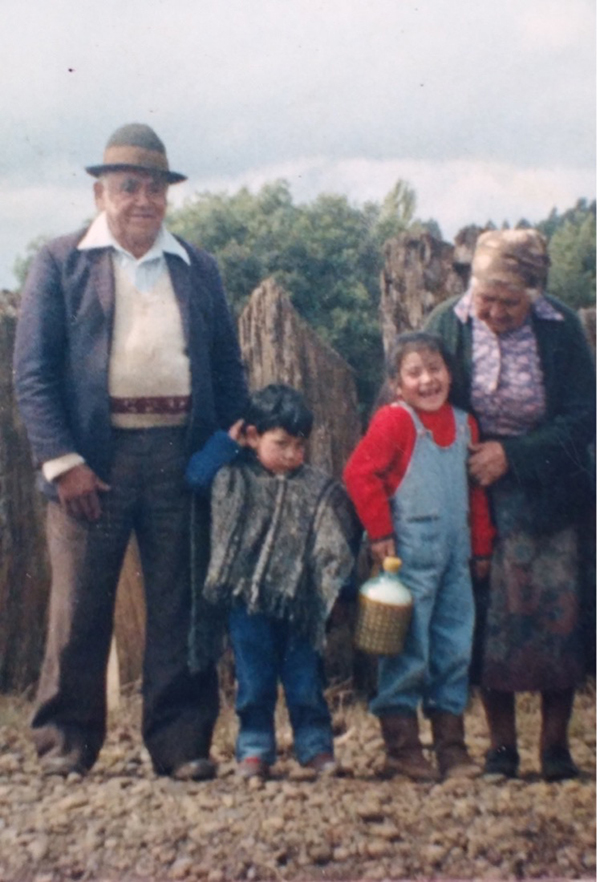
How did you get involved in the activism against the climate crisis?
I am Mapuche, an Indigenous community which had, historically, fought for the defense of what we consider our mother: the land, nature that surrounds us. It was my grandparents who sowed their knowledge in my path, their dreams and love for the environment in which they grew up and lived until they left this energetic plane.
My grandmother’s hands taught me about seeds, orchards, forest healing and colors to spin; my grandfather opened for me a world full of spirits and sentient beings, not only humans. That perfect synchronicity made me see the world like this, full of life and small moments that can change everything… like seeds.
The seeds were the ones that intertwined my path with my life partners, and we formed what today we call “Food Biodiversity,” a space where we dedicate ourselves exclusively to seeds with stories, inherited seeds, seeds that we call, “traditional.” We search for them, identify them, sow, describe, multiply, and share them.
Along with traditional seeds, we gather inherited knowledge, knowledge in agriculture, medicine, food, and even the spirituality of Indigenous communities. In the seeds also live the memories of personal, family, and territorial stories that embellish hundreds of tales that give meaning and a deep love to the orchard. We are fortunate to fight for something that gives us back with so much tenderness and happiness in the seedbeds, the land and its people.
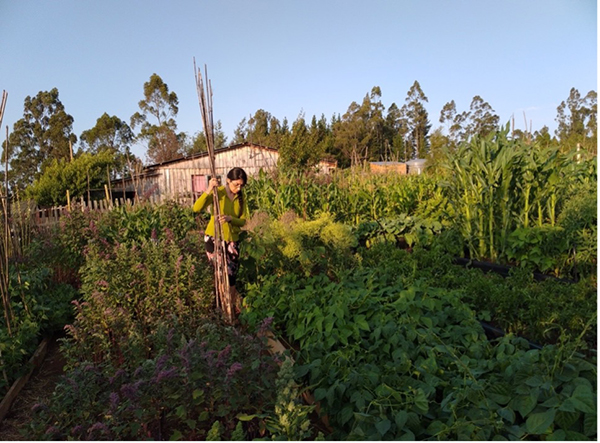
How does your work shape your perspective and experience as a woman?
The orchard is a space essentially cared for and inherited among women, from grandmothers, mothers, aunts, daughters, granddaughters; entire generations can be spun, particularly among Indigenous communities. There is care and tenderness and niceness among those who take care of an orchard, but also strength that forges the ground and character.
The heritage orchard with traditional seeds is a unique space. There is no traditional huertera (orchard woman) who does not recognize in their gardens a space of freedom, joy, companionship, and love. Because walking with our plants is to remember and honor the women who came before us, and those who generously are part of our current history.
All this synchrony between the heritage, history, dreams, desires, and loves that precede only strengthen a comparsa (group) walk, because it is not only me, but we are also many today, thousands before, and many more who will come to continue a web of life that feeds the body, the soul and provides healing and spirituality.
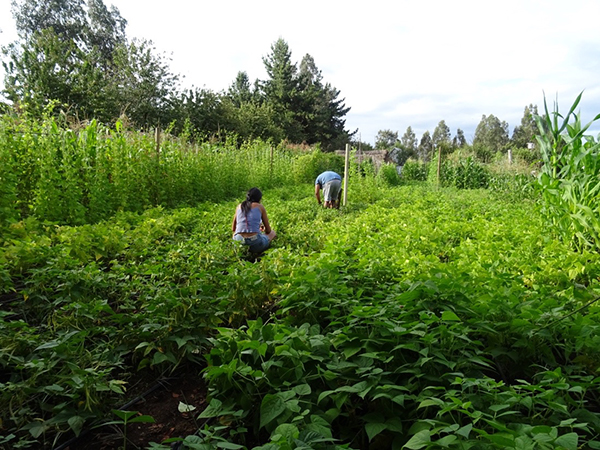
How have you seen climate change affect your life and your community?
Agriculture is precisely one of the most affected areas by climate change today. We have drought, but also water plundering due to the presence of forest and agricultural monocultures, which first devastated millenary native forests and today consume water without rest.
Depredation of our forests and wetlands are also synonymous with strong winds that dehydrate crops, unstable and extreme temperatures where plants often die or suffer serious effects for food production, also the increased presence of pests and sudden frosts, unbearable heat waves that generate forest fires every summer. Everything can be a great chaos, even more so if food is affected for our subsistence.
Fortunately, we have the answer in the same agriculture: Traditional seeds, those that spend 50 years in the territories; their presence has walked beside the crops of our ancestors, have already faced climatic changes throughout the history of mankind, thus possessing a unique adaptive capacity and are key to cope with climate change. That is why we always say that ANY SEED IS NOT THE SAME SEED. ·
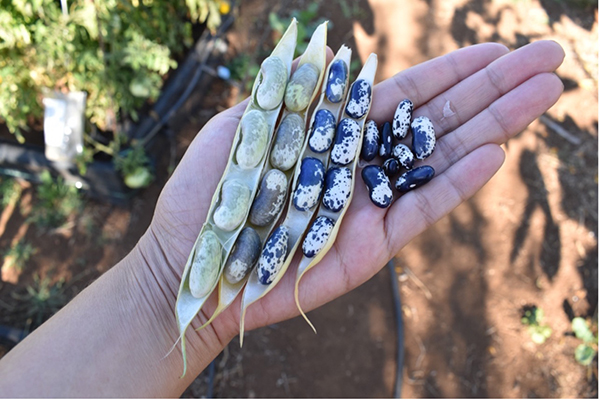
What are the biggest challenges you have faced in your work?
In terms of climate: the drought. Our orchard seed is in a territory where water is scarce to the point of disappearing in summer, leaving the crops adrift. It is here where the traditional seed shows us its huge adaptation power, we have seen it survive even in forest fires. At the other extreme, we have frosts that can last more than seven hours. Even so, our orchard survives, providing food and stronger seeds every year.
Politically, the challenge is to face the existing denial. To accept that it is necessary to rescue, protect, and value our traditional seeds as the heritage treasure they are. Not to leave them at the mercy of biopiracy, but to seek the means to return them to the fields and hands of those who want to plant them. That is what we do in our foundation.
Socially, we are challenged by the lack of knowledge regarding the displacement and replacement of varieties, which is why traditional seeds are often forgotten and lost amidst confusion and substitution of knowledge. It is precisely one of our greatest achievements, that today in our country people talk about traditional seeds and recognize through our publications many varieties that were thought to be lost.
The challenges are diverse, but there is always a way to create. The traditional seed itself adapts and faces change, and so do we.
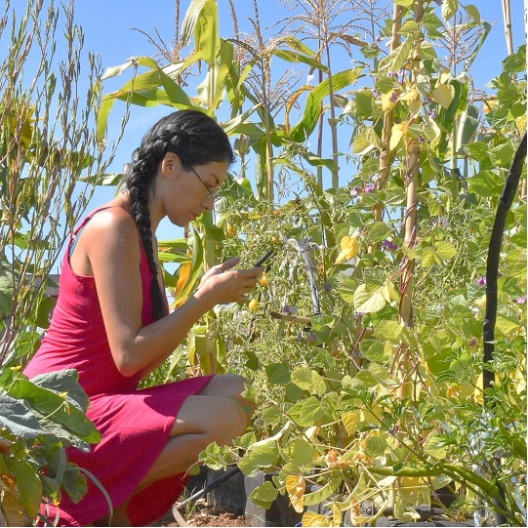
What advice would you give to other women who want to make a difference like you?
Dare to dream and create. With responsibility, honesty, and knowledge. We always need to risk swimming against the current, but it is also vital to have solid tools that strengthen the processes. That is why we must study content constantly, not only for the personal process, but also because we are part of a larger gear that we must strengthen.
May fear never paralyze us, rather stimulate us to forge new paths. We are the steps of thousands who came before us. Our ancestors always walk in our history. Their voices are eternal in the wind’s echo and their strength burns in our hearts. It is impossible not to act if we have the fervor of our blood running… We have never been alone, neither before, nor now.
—————
This is one article in a series with five women climate leaders asking five questions about their climate impact in their country. Read the rest of the stories and sign up for our email list.
Did Claudia inspire you? Learn more here on how to become a Climate Reality Leader and start making an impact today.


